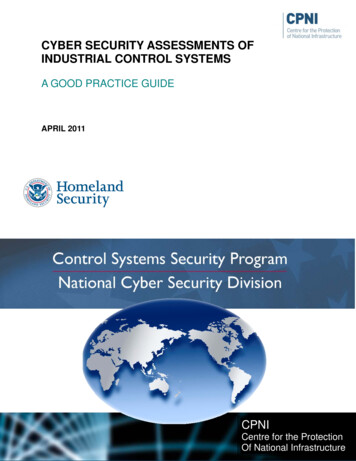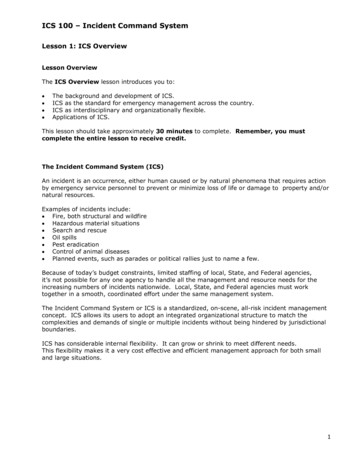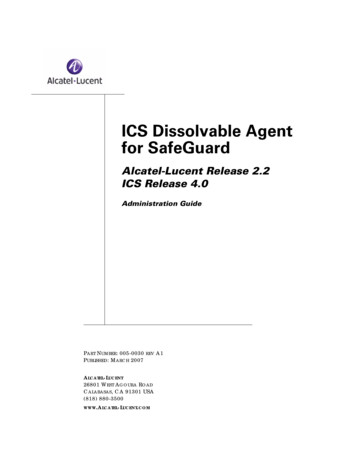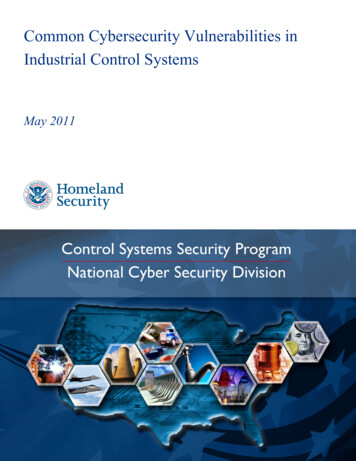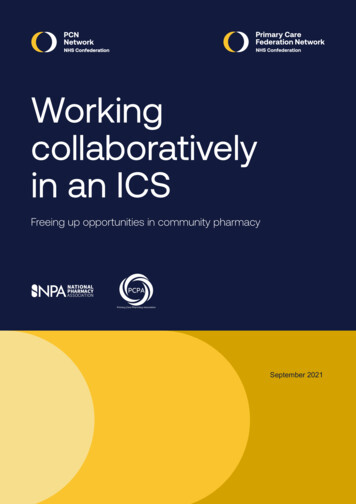
Transcription
Workingcollaborativelyin an ICS:Freeing up opportunities in community pharmacySeptember 2021
AboutAboutThis report explores the opportunities forgreater collaborative working betweencommunity pharmacy, primary carenetworks and federations withinintegrated care systems, and howbarriers can be overcome.The NHS Confederation is the membership body that bringstogether and speaks on behalf of organisations that plan,commission and provide NHS services in England, Northern Irelandand Wales. The members we represent employ 1.5 million staff,care for more than 1 million patients a day and control 150 billionof public expenditure. We promote collaboration and partnershipworking as the key to improving population health, delivering highquality care and reducing health inequalities.As part of the NHS Confederation, the PCN Network and PrimaryCare Federation Network provide a strong national voice forprimary care, representing the views of primary care networks andfederations, supporting their development and influencing thenational policy debate.
AboutThe National Pharmacy Association is the representative voice ofindependent community pharmacies across the UK. We providea range of services, including learning and development for thewhole pharmacy team, to help our members provide an excellentservice to their patients and communities.The Primary Care Pharmacy Association (PCPA) supports primarycare pharmacists and pharmacy technicians through a network ofleading practitioners, sharing best practice and inspiring innovation.PCPA’s mission is to promote clinical excellence for the benefit ofour patients, our members and our profession.
ContentsContents5Key points7 Background9Context10 Moving forwardWhat are the opportunities for communitypharmacy, PCNs and GP federations to workcollaboratively with ICSs?13 Removing barrier to progressWhat is hindering collaboration and what needsto change?17Viewpoint18 Appendix 1: Roundtable contributions19 Appendix 2: Key actions for PCN clinicaldirectors, leads and community pharmacists4 – Working collaboratively in an ICS: freeing up opportunities in community pharmacy
Key pointsKey points Community pharmacy is an integral part of the NHS and has avital role to play as a full partner within a primary care network(PCN). Medicines’ safety and optimisation are widely recognisedas part of its unique skill set but, increasingly, communitypharmacy is collaborating with partners in primary care to deliverintegrated clinical services in integrated care systems (ICSs). In July 2021, leaders from leading pharmacy representativebodies, GP federations and PCNs took part in a roundtablediscussion to highlight the opportunities that workingcollaboratively in an ICS has to offer, and to discuss solutions tocurrent barriers. Participants identified seven key requirements to ensure that theopportunities and benefits of involving community pharmacyare realised. These requirements are relevant to: NHS leadersdeveloping and implementing ICS guidance; communitypharmacists who want to play their part in shaping new waysof working; partners working in general practice and in GPfederations; and existing leaders in ICSs and PCNs.1. Community pharmacists must be given the time andspace to get involved in working through the developmentof local services with their primary care colleagues.2. Community pharmacy and general practice need to workthrough the historical perceptions of their relationship asproviders, moving from a position of competition to one ofcollaboration and a single voice for primary care.5 – Working collaboratively in an ICS: freeing up opportunities in community pharmacy
Key points3. To achieve change at scale, service developments mustbe translated into a national contract specification forlocal adoption with the ability for some local flexibility to beapplied to meet the specific needs of a local population.4. Nationally specified services should be properly resourced,recognising that commercial viability is a valid request bycontractors in the NHS.5. ICSs must support the implementation of nationallyspecified services, locally ensuring there is projectmanagement, IT deployment and system-level governanceand oversight for implementation. This should be backedup with appropriate mechanisms to involve communitypharmacy in decision-making at all levels and resourcesavailable to enable this.6. An appropriate information technology and informationgovernance framework is needed to support data sharingand facilitate the development of local services and theimplementation of national services.7. An appropriate medico/legal framework is needed whichrecognises the role of pharmacists as independentprescribers and resolves issues relating to conflicts ofinterest.6 – Working collaboratively in an ICS: freeing up opportunities in community pharmacy
BackgroundBackgroundThe NHS has been working towards the implementation ofintegrated care systems (ICSs) for several years and recently therehas been a move to solidify this way of working through statutorychanges. In June 2021, the ICS Design Framework set out some ofthe detail of how NHS organisations should continue their journeytowards an ICS and prepare for the new statutory arrangements.Central to the new arrangements is the concept of collaborationand partnership working at a local level; something which isstrongly supported by the NHS Confederation and its membership.We were therefore delighted when the community pharmacysector approached us to host a roundtable on ensuring thatcommunity pharmacy is effectively integrated in ICSs.Working closely with the National Pharmacy Association, webrought together a group of leaders across community pharmacy,primary care networks (PCNs) and GP federations to discuss theopportunities of collaboration and to identify the key enablersavailable to local systems. We also explore some of the barriersand ideas for how they should be addressed. The roundtable waschaired by Dr Graham Jackson, GP and senior clinical adviser atthe NHS Confederation, on 7 July 2021, the day after the new healthand care bill was published. For a full list of contributors to theevent, see Appendix 1.This report highlights the key points from the discussion and isaimed at a range of NHS leaders, at local and national level, whoare involved in developing and implementing guidance on howorganisations are expected to operate with their partners in an ICSfrom April 2022. It is relevant to community pharmacists who wantto play their part in shaping new ways of working; to their partnersworking in general practice and GP federations; and to existingleaders in PCNs.7 – Working collaboratively in an ICS: freeing up opportunities in community pharmacy
BackgroundIn addition to the full report of the discussion, we have produceda briefing for PCNs and community pharmacists which highlightspractical actions to deliver quick wins from integrated working withcommunity pharmacy. The key actions from this briefing are setout in Appendix 2 and the full document is available on the NHSConfederation website.8 – Working collaboratively in an ICS: freeing up opportunities in community pharmacy
ContextContextThe five-year community pharmacy contractual framework(CPCF), published in July 2019, set out a joint vision for the servicewhich recognised the role that community pharmacists have toplay in delivering clinical services. It set out a clear expectation ofcollaboration with PCNs and it revised funding arrangements forcommunity pharmacy, to facilitate integrated delivery models. Inessence it established community pharmacy as a full partner inPCNs with a clear role in urgent care, prevention and medicinesoptimisation, which in return required community pharmacists tocollaborate not only with their partners but with each other, in away that many had not been able to do so before.Some PCN service developments, as anticipated in the CPCF,did not progress as planned, due in the main to the COVID-19pandemic and the unprecedented impact it had on all partnersin primary care. Conversely, the pandemic also acceleratedcollaborative working in some areas, with services coming togetherin creative ways to address the high level of need in communities.The key aspects of this are highlighted in our briefing One Year Onand One Pandemic Later.With the NHS looking to the future as the health and care billpasses through parliament, we wanted to bring leaders in primarycare together – from general practice and community pharmacy– to review the opportunities that exist now to release the benefitsof integration enabled through the CPCF. And to examine whatfurther change may be required to remove barriers to integration.9 – Working collaboratively in an ICS: freeing up opportunities in community pharmacy
Moving forwardMoving forwardWhat are the opportunities for communitypharmacy, PCNs and GP federations to workcollaboratively with ICSs?Participants in the roundtable discussion all welcomed theopportunities signalled in the ICS Design Framework. It was seenas an important mechanism to bring together both commissionersand providers in primary care in the same place to commissionthe whole patient pathway instead of in silos. This was seen assomething where community pharmacy has a unique contributionto make because of its strong connection with local communitiesand the understanding of patient need that this brings, combinedwith a range of clinical skills that enable it to be the first port of callfor a range of patient conditions.“ Medicines will always follow the patient, so why do wenot commission a pathway rather than commission insilos I think the ICS framework will actually open thatdiscussion up, and pharmacies will have an absolutelyvital role in that, but we need to ensure that the voicesand true advocacy [for the role community pharmacycan play] are being made at strategic boards and atprovider boards.”One participant pointed to the fact that commissioning via anICS will allow alignments to the GP and community pharmacycontracts that already exist in a small way to be further enhanced,such as provision of flu vaccinations. It was stressed that therealisation of the current expectation that ICSs will be able to use10 – Working collaboratively in an ICS: freeing up opportunities in community pharmacy
Moving forward“the administratively efficient” route of commissioning communitypharmacy at a local level without recourse to the NHS or localauthority standard contract would be critical here as they areprohibitive for small locally developed services.While the conversation was about benefits of minor contractualalignments and small local service change, all agreed that this wasan important aspect of the reforms. These small local serviceshave the ability to deliver a disproportionate benefit in terms ofthe positive impact on patient outcomes and improved workingrelationships between GPs and community pharmacists. Similarly,it was noted that the requirement to work together on practicalchanges, such as implementing a shared care record by April2022, would be an important catalyst for system working acrossproviders.The potential and need for primary care providers to integrate witheach other as well as with other sectors was a constant themethroughout the discussion. This was seen as a key mechanism forgaining a voice for primary care within the ICS and ensuring that,as stated in the ICS Design Framework, it is embedded in decisionmaking at all levels of the system.“ We probably see GPs acting sometimes as a primarycare soloist and really what we probably want to tryand do is build a bit of a choir because we think if webring in the voice of community pharmacy , draw ourcolleagues in dental in and indeed our [optometry]colleagues as well, the stronger voice of primary carewill be heard we are definitely stronger together anda better-balanced system will result at an ICS level ifwe draw together at scale rather than just equatinggeneral practice with primary care. ”11 – Working collaboratively in an ICS: freeing up opportunities in community pharmacy
Moving forwardWith respect to the clinical skills of community pharmacists, oneparticipant drew attention to three ways in which these can beused for system benefit: Community pharmacy being seen as the optimum place to goto care for certain conditions. Community pharmacy being part of a clinical patient pathway,such as the Discharge Medicines Service, which is somethingthat community pharmacists already provide with a potentialto deliver system benefit in terms of reduced readmissions andoccupied bed days. Community pharmacy as part of a clinical service deliverymodel, particularly in PCNs. For example, the delivery ofhypertension case finding.There was strong support for using the broader clinical skillsof community pharmacists in this way. However, it was felt thatmedicines optimisation should be a golden thread running throughthe community pharmacy offer, particularly given the high levelof NHS spend on medicines and the impact that communitypharmacy can have on improving patient outcomes.The integrating NHS pharmacy and medicines optimisationprogramme (IPMO) was highlighted here as a potential catalyst,although it was recognised that there is still a long way to go to ineffectively harnessing the expertise of pharmacists to transformsystems. The role of PCN pharmacists and practice pharmacistswas welcomed, but the need to ensure that these roles drawcommunity pharmacy towards providing patient care pathways,and not push them away, was emphasised.12 – Working collaboratively in an ICS: freeing up opportunities in community pharmacy
Removing barriers to progressRemoving barriers to progressWhat is hindering collaboration and whatneeds to change?One participant, who is leading community pharmacy within an ICS,described “a lack of clarity at the ICS level and the locality level andindeed at neighbourhood level as to what community pharmacycan do”. This experience was echoed by others. GPs involved inthe discussion acknowledged that their day-to-day relationshipswith community pharmacy are frequently driven by operationalpressures and hence discussion is often limited to issues suchas the availability of medicines. This has given rise to a positionwhereby services that are currently part of the CPCF are notuniversally known about or implemented.It was acknowledged that this lack of clarity could be addressedif the pharmacy profession articulated what it could deliver in thecontext of the priorities of the commissioning body. It was agreedthat to enable this to happen, it is vital for community pharmacy tobe involved in the early stages in the ICS as it develops its prioritiesand associated commissioning framework.To facilitate this involvement, there was a call for a consistentapproach across an ICS, because of the complexities involvedin responding to multiple ways of doing things. For example, oneparticipant described the time-consuming process of workingacross various structures in the ICS to implement the CommunityPharmacist Consultation Service, even though there is a nationalspecification for it and it forms part of the CPCF. This gave rise to acomment from one participant about the importance of sorting thelocal implementation of nationally specified services. Without this,13 – Working collaboratively in an ICS: freeing up opportunities in community pharmacy
Removing barriers to progresscommunity pharmacy will be constrained in its ability to add valuein the way that has been intended nationally.There were examples described of GP practices workingcollaboratively with their colleagues in community pharmacyto establish locally specified services, such as an early minorailments scheme; community pharmacy leading the COVID-19vaccination service; and exploration of the potential for primarycare professionals outside of general practice to have directaccess to a range of diagnostics. The ‘independents’ in thecommunity pharmacy sector were described as particularly wellplaced to match the way in which general practice has traditionallyresponded to overcome “bureaucratic obstacles” to get newservices up and running quickly.However, it was recognised that there are issues of sustainabilitywith respect to small-scale locally developed services. Someparticipants described how they had run into difficulties whenit came to ensuring compliance with clinical and informationgovernance requirements. This can be particularly problematic forlarger community providers that have national and, in some cases,international company policies that they must adhere to.One participant described how the approach of nationalspecification for local adoption would assist larger communitypharmacy providers to respond at scale; the way that the COVID-19vaccination programme had been taken up by communitypharmacy being one example of this.One interpretation of the discussion was that services developedlocally on a small scale have a place in integrated and collaborativeworking, as they foster innovation and can be the vehicle forproviding proof of concept and building relations across primarycare professionals at grassroots level. There are three ways inwhich these innovative services can be supported to develop:14 – Working collaboratively in an ICS: freeing up opportunities in community pharmacy
Removing barriers to progress Community pharmacists must be given the time and spaceto get involved in working through the development of localservices with their primary care colleagues. Community pharmacy and general practice need to workthrough the historical perceptions of their relationship asproviders, moving from a position of competition to one ofcollaboration. Participants at the roundtable believed thereto be mutual benefit in this approach, for patients, individualcontractors and primary care as a whole. A national specification for information governance/local healthrecords is needed as this is a common obstacle to integratedworking.For these innovative services to have an ‘at scale’ impact, there wasagreement that they must: be translated into a national contract specification for localadoption, with the ability for some local flexibility to be appliedto meet the specific needs of a local population be properly resourced, recognising that commercial viabilityis a valid expectation for contractors in the NHS and goodeconomic principles need to be applied to commissioning. be effectively communicated to the ICS and appropriatelysupported around implementation, with appropriatemechanisms in place for community pharmacy involvement indecision-making at all levels and resources available to enablethis have the appropriate information technology and informationgovernance in place to support necessary data flows, backedup by an environment of trust across the clinical professionalswho are writing and reading the shared record15 – Working collaboratively in an ICS: freeing up opportunities in community pharmacy
Removing barriers to progress have an appropriate medico/legal framework in place whichrecognises the role of pharmacists as independent prescribersand resolves issues relating to conflicts of interest.Finally, the group challenged each other to ensure that wherethere are already national services in place, work to implementthem at local level must be prioritised. While it is recognised thatcommunity pharmacy has finite resources, there is an ability toharness additional capacity in response to plans to extend therange of clinical services that it delivers.Two services were highlighted as ones that are part of the CPCFand relevant to every system because of the proven impact onoutcomes for patients, reduced NHS spend and reduced workloadin general practice. These were the Community PharmacistConsultation Service (CPCS) and the Discharge Medicines Service.It was acknowledged that by demonstrating an ability to getthese two services implemented, it would generate confidence todevelop further services in the future.To support this, we have produced a briefing aimed at PCNs.“ If we cannot do the stuff that’s nationally been sorted,and has landed on a plate; the funding [for the CPCS]has already been sorted as part of the contractframework. If we can’t get general practice and PCNsto mobilise in partnership with their colleagues incommunity pharmacy. If we can’t do that, how are wegoing to innovate new stuff? ”16 – Working collaboratively in an ICS: freeing up opportunities in community pharmacy
ViewpointViewpointCommunity pharmacy has a unique role to play in collaboratingwith its partners across an ICS to support the restoration of coreservices and the delivery of local priorities. It offers a combinationof leadership of the medicines’ safety and optimisation agenda,with clear benefits of improved patient safety and reduced NHSspend, and an ability to deliver a range of clinical services thatreduce workload for primary care partners and increase patientaccess.However, at a time of rapid change and exceptional challenge forthe NHS and its partners, there is risk that the impact communitypharmacy could deliver will be constrained by a number of barriersthat are present in the current system.The roundtable discussion highlighted these barriers and mostimportantly identified seven key tasks for national and local leadersto address to ensure that they are addressed in the emergingdevelopment of ICSs. Fundamental to all of them is a need toenable community pharmacy to play an active part in decisionmaking at all levels of the ICS and become integral to its clinicaland professional leadership.17 – Working collaboratively in an ICS: freeing up opportunities in community pharmacy
Appendix 1: Roundtable contributorsAppendix 1: RoundtablecontributorsAndrew Lane, Chair, National Pharmacy AssociationMichael Lennox, Local Integration Lead, National PharmacyAssociationMalcolm Harrison, Chief Executive, Company Chemists’ AssociationJames Wood, Director of Contractor and LPC Support,Pharmaceutical Services Negotiating CommitteeHelen Kilminster - National Vice President, Primary Care PharmacyAssociationLuvjit Kandula FRPharmS Primary Care Pharmacy AssociationNational Community Pharmacy Integration LeadDr Mark Spencer, Clinical Director, Fleetwood PCNGraham Stretch, Executive Chair, Primary Care PharmacyAssociationKaren Livesey, Practice Business Manager, The Orchard SurgeryLaura Sherburn, Chief Executive, Primary Care Doncaster18 – Working collaboratively in an ICS: freeing up opportunities in community pharmacy
Appendix 2: Key actions for PCN clinical directors, leads and community pharmacistsAppendix 2: Key actions forPCN clinical directors, leads andcommunity pharmacistsPCN clinical directors and leads Talk to your local community pharmacists about implementingthe national NHS Community Pharmacist Consultation Service– this enhanced service enables general practice to referpatients directly to a community pharmacist for a minor illnessconsultation. The national specification is ready to go andonce a local referral pathway has been agreed it can deliver animmediate benefit to patients and divert some of the workloadaway from GPs. More information can be found on the PSNCwebsite. Ensure that trusts in your patch are using the DischargeMedicines Service which is a service that all communitypharmacists provide. This service has a demonstrated impacton patient safety and has significantly reduced hospitalreadmissions. More information can be found on the PSNCwebsite. Support community pharmacists in your area to navigate theICS so that they can link into discussions about representationin the emerging governance arrangements and play their part inclinical and professional leadership.19 – Working collaboratively in an ICS: freeing up opportunities in community pharmacy
Appendix 2: Key actions for PCN clinical directors, leads and community pharmacistsCommunity pharmacists Find out what the key priorities and capacity constraints are inyour PCN area – get together with your pharmacy colleaguesin the area and discuss how your skills, and the services youcould provide, would support the PCN to address them. If theCommunity Pharmacy Consultation Service isn’t on your list itprobably should be. Engage in a discussion with your PCN lead/clinical director –your local pharmaceutical committee will be able to facilitatethese contacts. The earlier you do this the better as PCNs willbe starting to look at how they represent primary care in thegovernance structure at place and system level. Remember that while PCNs have the general practiceregistered list at its core, primary care means you as well asGPs – and your colleagues in dentistry and optometry. TheNHS Confederation is working hard to ensure that opportunitiesfor clinical leadership are available to all primary care clinicians,with appropriate resources for backfill and development, solook out for leadership roles in your area. It may feel like youare stepping out of your comfort zone, but you will be warmlywelcomed by your colleagues across primary care.20 – Working collaboratively in an ICS: freeing up opportunities in community pharmacy
18 Smith SquareWestminsterLondon SW1P 3HZ020 7799 6666www.nhsconfed.org@NHSConfedIf you require this publication in an alternative format,please email enquiries@nhsconfed.org NHS Confederation 2021. You may copy or distribute this work, butyou must give the author credit, you may not use it for commercialpurposes, and you may not alter, transform or build upon this work.Registered charity no. 1090329
17 Viewpoint 18 Appendix 1: Roundtable contributions 19 Appendix 2: Key actions for PCN clinical directors, leads and community pharmacists. 5 - Working collaboratively in an ICS: freeing up opportunities in community pharmacy Key points Key points

